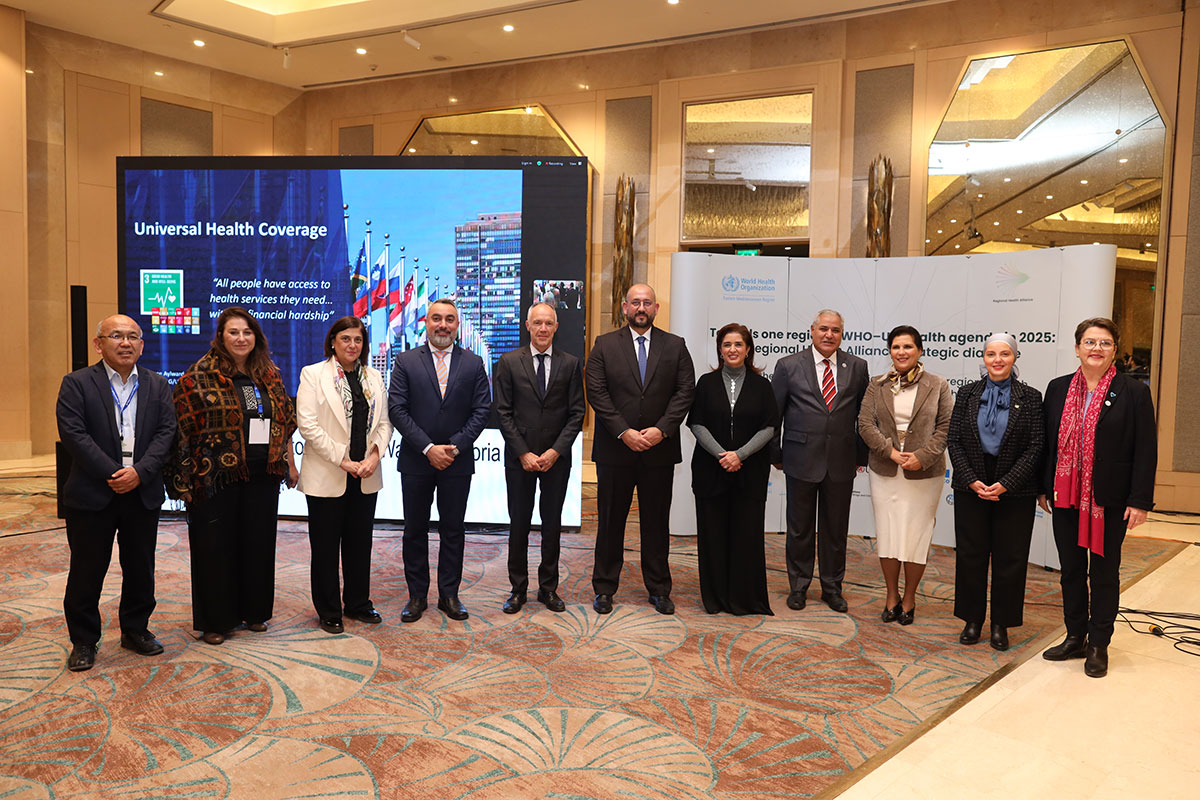
15 January 2025, Cairo, Egypt – The Regional Health Alliance (RHA) Strategic Dialogue, Towards One Regional WHO-UN Health Agenda in 2025, convened 86 in-person and 11 virtual attendees, including the technical focal points and regional directors of the 18 participating UN agencies.
Attendees from the 3 levels of WHO included assistant directors general from WHO headquarters, senior management, including directors of departments, and regional advisors and technical officers from the WHO Regional Office for the Eastern Mediterranean, and representatives from WHO country offices providing critical field insights. Outcomes included the endorsement of a new RHA structure and Joint Action Plan (JAP) 2025 and the introduction of the 3 regional flagship initiatives.
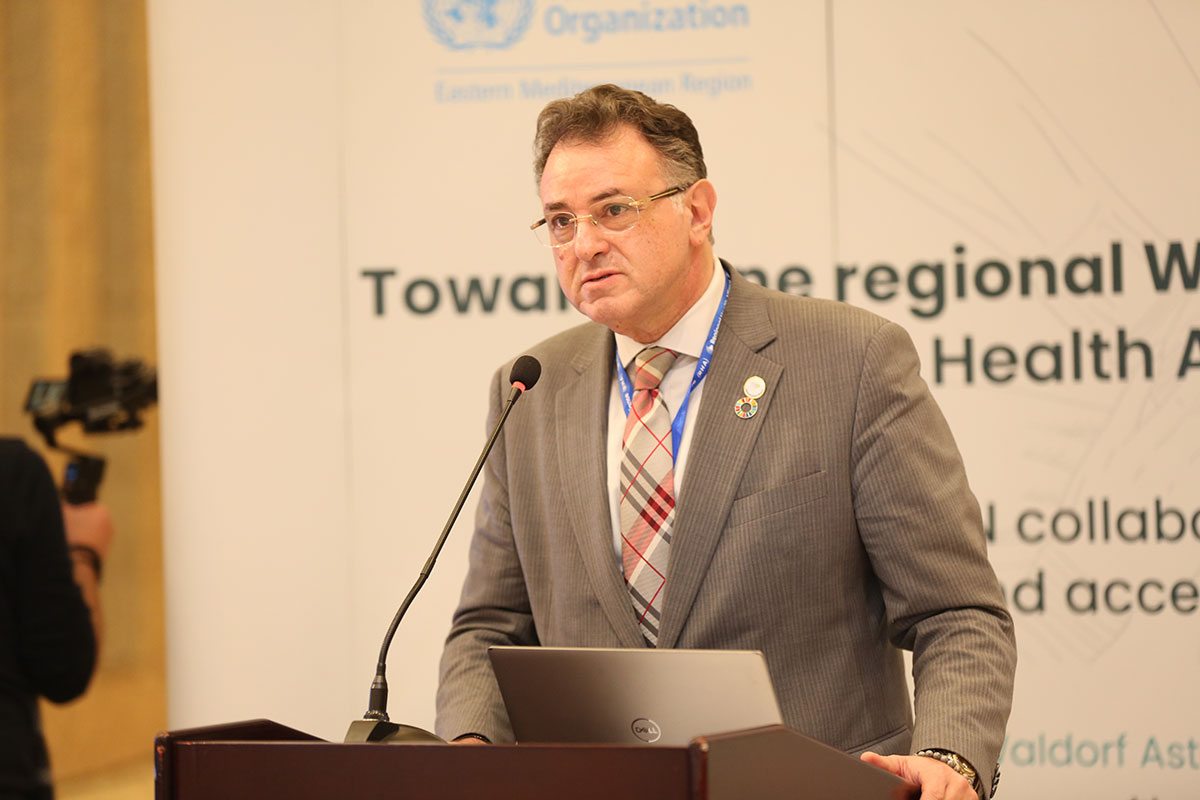 Director of Programme Management at the Regional Office for the Eastern Mediterranean Dr Adham Ismail. Photo credit: WHOReshaping RHA for greater impact
Director of Programme Management at the Regional Office for the Eastern Mediterranean Dr Adham Ismail. Photo credit: WHOReshaping RHA for greater impact
The new RHA structure aims to sharpen the focus on primary health care for universal health coverage; health determinants, risk factors and community engagement; health emergency preparedness and response, and research, innovation and evidence-informed policy.
Director of Programme Management at the Regional Office for the Eastern Mediterranean Dr Adham Ismail underlined the importance of coordinated action, saying: “Planning is just the first step. Success depends on coordinated, evidence-driven and sustained action with engagement from all stakeholders. Let us align efforts, deepen partnerships and prioritize the needs of those we serve.”
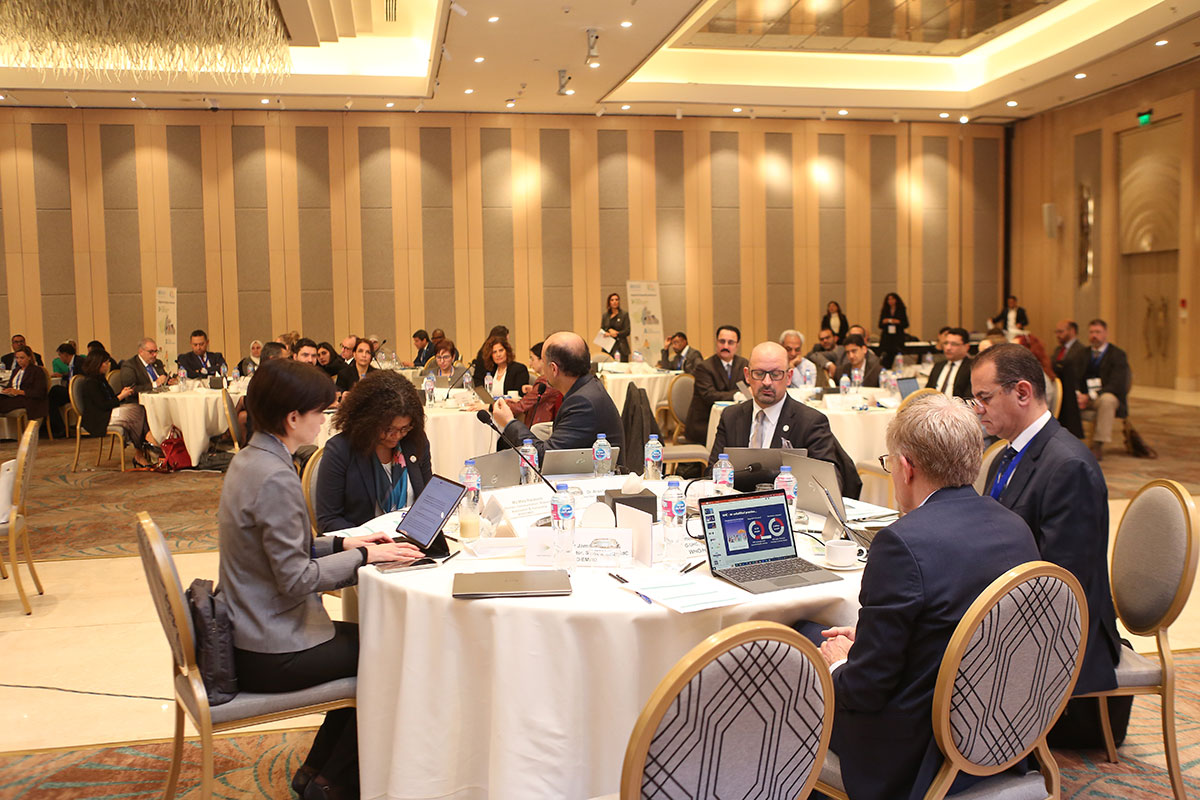 Participants at the Regional Health Alliance’s third annual meeting. Photo credit: WHOWorking together, achieving more: strengthening partnerships
Participants at the Regional Health Alliance’s third annual meeting. Photo credit: WHOWorking together, achieving more: strengthening partnerships
Collaboration was at the heart of the dialogue as participants committed to coordinate efforts within thematic groups to avoid duplication and maximize resources.
Flagship initiatives take centre stage
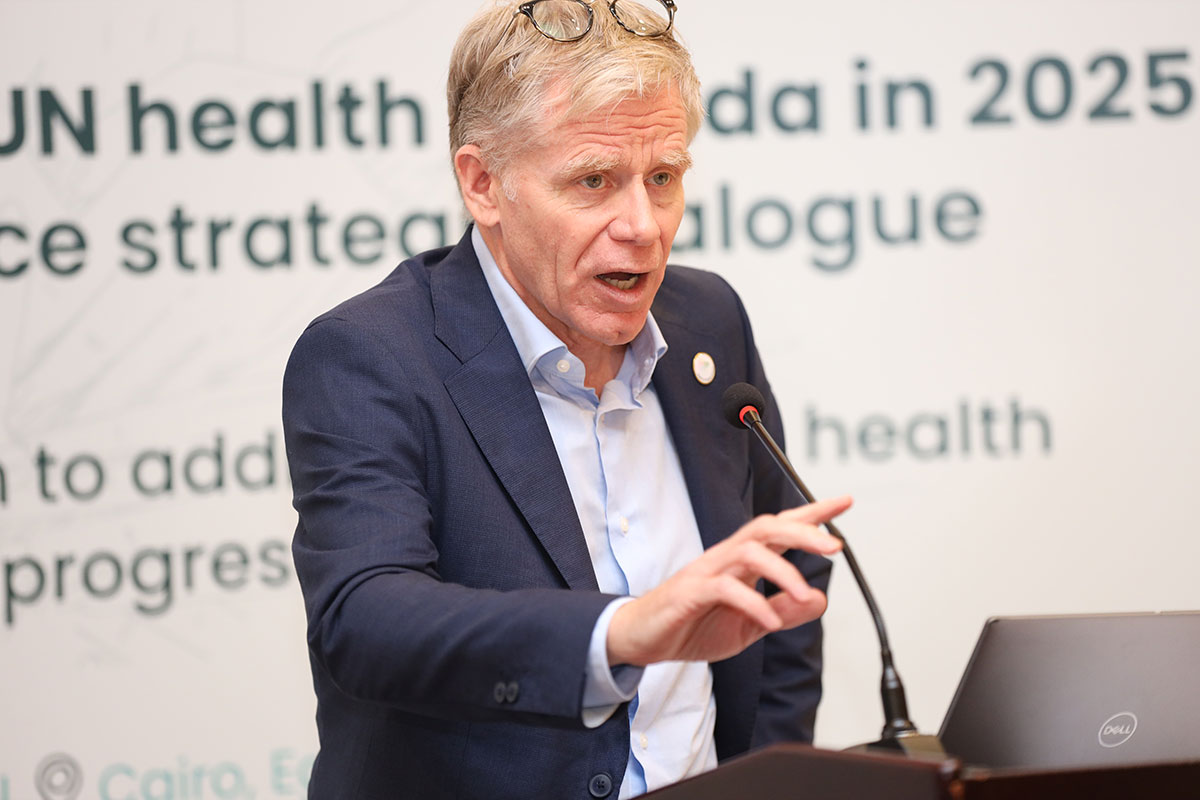 WHO Assistant Director-General for Universal Health Coverage, Life Course Division Dr Bruce Aylward. Photo credit: WHOWHO Assistant Director-General for Universal Health Coverage, Life Course Division Dr Bruce Aylward told participants that the 3 regional flagship initiatives, with their focus on expanding equitable access to medical products, investing in a resilient and sustainable health workforce and accelerating public health action on substance use, will “bring the full weight of UN agencies together to solve complex challenges – whether it’s workforce, financing, migration or education – ensuring a collective, strategic response to drive progress”.
WHO Assistant Director-General for Universal Health Coverage, Life Course Division Dr Bruce Aylward. Photo credit: WHOWHO Assistant Director-General for Universal Health Coverage, Life Course Division Dr Bruce Aylward told participants that the 3 regional flagship initiatives, with their focus on expanding equitable access to medical products, investing in a resilient and sustainable health workforce and accelerating public health action on substance use, will “bring the full weight of UN agencies together to solve complex challenges – whether it’s workforce, financing, migration or education – ensuring a collective, strategic response to drive progress”.
Joint Action Plan (JAP) 2025
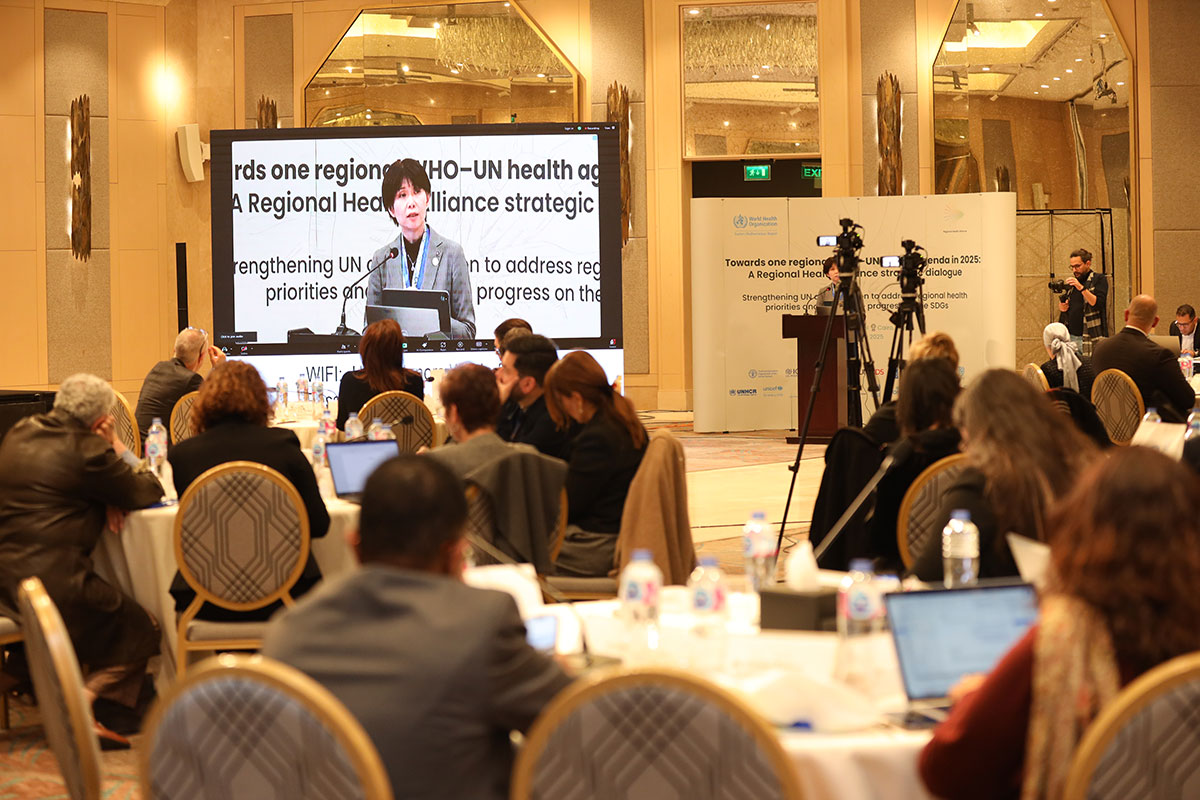 Participants listen to WHO Assistant Director-General for Access to Medicines and Health Products Dr Yukiko Nakatani. Photo credit: WHOJAP 2025 sets out clear, time-bound deliverables that reflect the shared priorities of RHA’s member agencies. It will help ensure efforts align with the sustainable development goals agenda, with a focus on equity, gender responsiveness and human rights.
Participants listen to WHO Assistant Director-General for Access to Medicines and Health Products Dr Yukiko Nakatani. Photo credit: WHOJAP 2025 sets out clear, time-bound deliverables that reflect the shared priorities of RHA’s member agencies. It will help ensure efforts align with the sustainable development goals agenda, with a focus on equity, gender responsiveness and human rights.
Highlighting the importance of alignment, WHO Assistant Director-General for Access to Medicines and Health Products Dr Yukiko Nakatani underlined how “interagency collaboration is essential to addressing the multifaceted challenges that hinder equitable access to medicines and health technologies”.
“Together, we are advancing strategic actions that include supporting countries to develop policies and improve governance to promote equitable access to medicines and reduce intellectual property barriers.”
Building a healthier future together
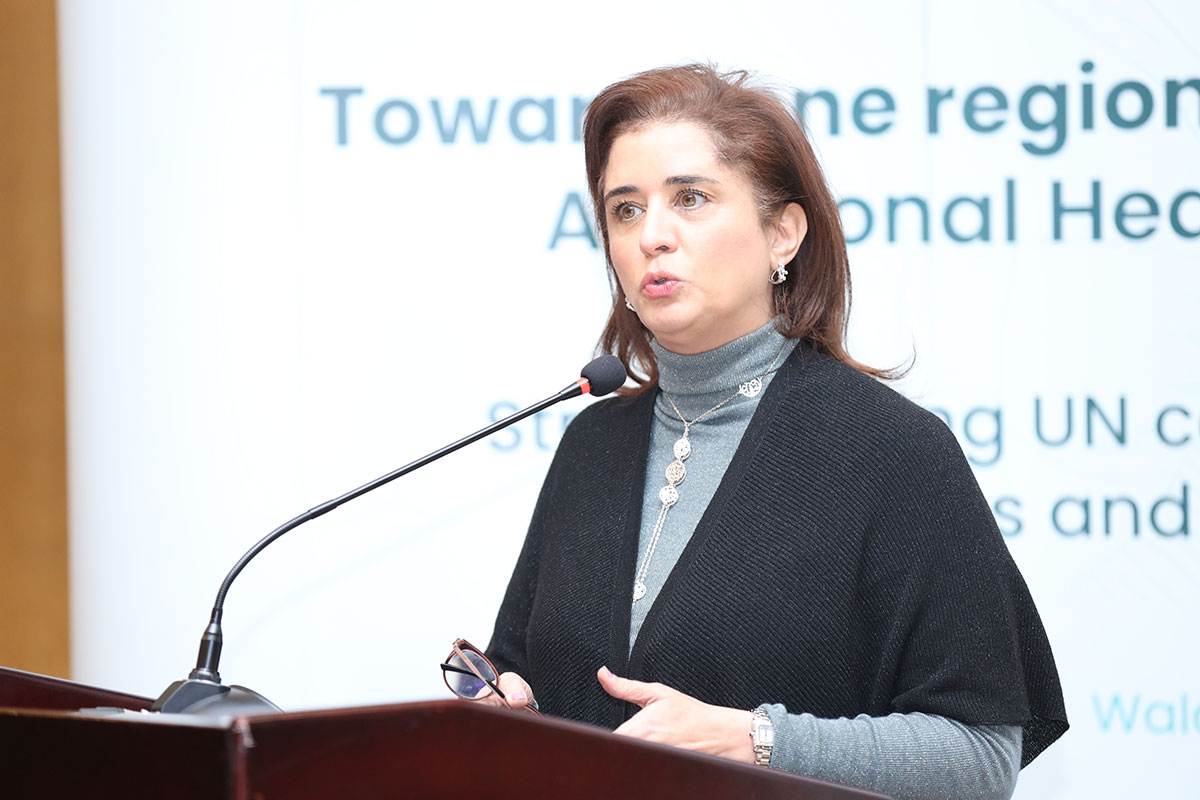 WHO Regional Director for the Eastern Mediterranean Dr Hanan Balkhy. Photo credit: WHOAs the meeting drew to a close, the message was clear: the success of JAP 2025 will depend on collaboration, commitment and a shared drive to ensure health for all. WHO Regional Director for the Eastern Mediterranean Dr Hanan Balkhy summed up the spirit of the gathering, saying: “I urge each of us to continue to work with urgency and resolve. The 2025 Joint Action Plan offers a clear roadmap, but success depends on our ability to implement it with integrity, accountability and collaboration.”
WHO Regional Director for the Eastern Mediterranean Dr Hanan Balkhy. Photo credit: WHOAs the meeting drew to a close, the message was clear: the success of JAP 2025 will depend on collaboration, commitment and a shared drive to ensure health for all. WHO Regional Director for the Eastern Mediterranean Dr Hanan Balkhy summed up the spirit of the gathering, saying: “I urge each of us to continue to work with urgency and resolve. The 2025 Joint Action Plan offers a clear roadmap, but success depends on our ability to implement it with integrity, accountability and collaboration.”
By reinforcing partnerships and aligning efforts with regional and national priorities, the journey ahead promises a brighter, healthier future for the Region, one in which no one is left behind.













